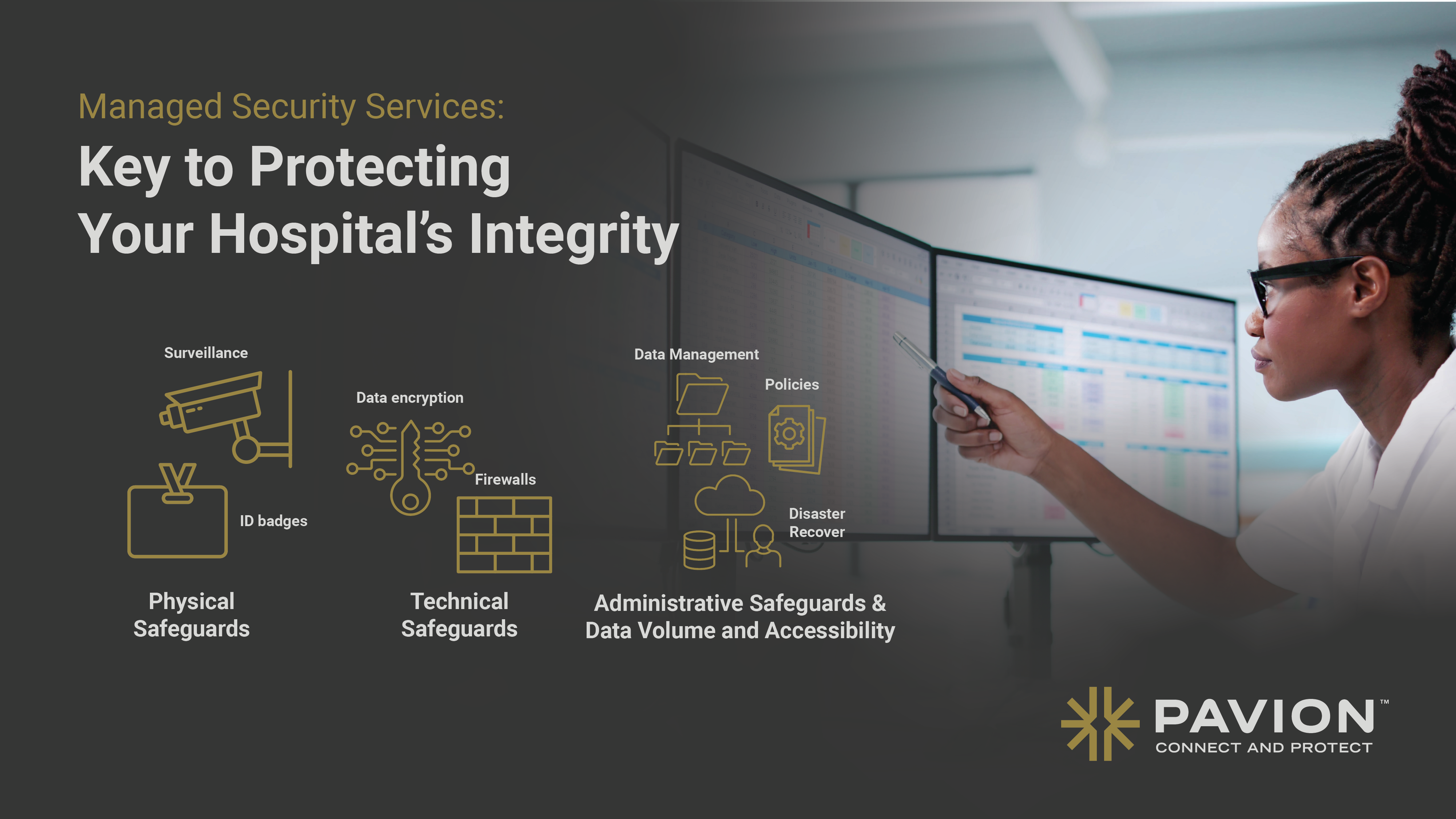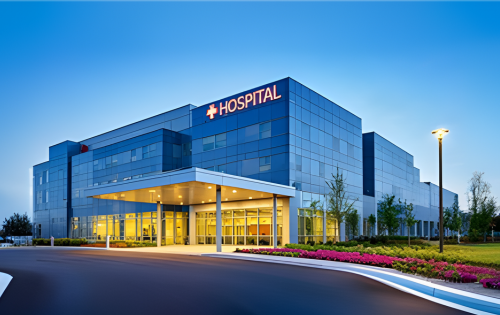
Managed Security Services: Key to Protecting Your Hospital’s Integrity
In the modern healthcare landscape, hospitals and healthcare systems face increasing challenges related to cybersecurity, data protection, operational efficiency, and physical safety. As digital transformation accelerates, so does the need for hospitals to protect the integrity of their patients, staff, and infrastructure. Central to this mission is the deployment of managed security services—a strategic, scalable, and expert-driven solution that ensures comprehensive protection across the board.
The New Threat Landscape in Healthcare
Healthcare organizations have become one of the most targeted sectors by cybercriminals. According to the U.S. Department of Health and Human Services, healthcare cyberattacks have more than doubled in the last five years, and the numbers continue to rise. Why? Because healthcare data is incredibly valuable. Medical records, personal identifiers, and financial details are worth much more on the black market than credit card information.
These risks make data protection in hospitals more than a compliance checkbox—it’s a core element of operational integrity. When a hospital suffers a breach, the consequences are not just financial or regulatory. They impact human lives. Systems go down, patients are diverted, and treatments are delayed. Every second counts in a medical environment, and a security lapse can be catastrophic.
That’s where managed security services (MSS) come into play. MSS provides hospitals with 24/7 monitoring, proactive threat detection, incident response, vulnerability management, and compliance support—all handled by external cybersecurity experts who specialize in healthcare.
What Are Managed Security Services?
Managed security services are outsourced cybersecurity solutions provided by a third-party company to monitor and manage your hospital’s security infrastructure. These services include, but are not limited to:
- Threat detection and response
- Security event monitoring (SIEM)
- Vulnerability assessments and patch management
- Identity and access management (IAM)
- Endpoint protection
- Firewall and network security
- Cloud and data security
- Regulatory compliance support
This type of support is critical in healthcare, where internal IT teams are often stretched thin trying to manage daily operations, technology upgrades, and the growing landscape of connected medical devices (IoT).
Why Use Managed Security Services in Hospitals?
Managed security services allow hospitals to shift from a reactive to a proactive security posture. Rather than waiting for a breach to occur, MSS enables healthcare organizations to monitor systems in real time, identify vulnerabilities, and respond instantly to threats.
Key Benefits of MSS in Healthcare:
- 24/7/365 Protection: Security doesn’t sleep. MSS ensures your systems are monitored at all times.
- Expertise on Demand: Gain access to top-tier cybersecurity experts without hiring an in-house team.
- Cost-Effective: Avoid the high costs of hiring, training, and retaining full-time cybersecurity staff.
- Scalability: As your hospital grows or changes, your security can scale with it.
- Regulatory Compliance: MSS helps hospitals meet stringent healthcare compliance standards like HIPAA, HITECH, and NIST.
- Rapid Incident Response: When something goes wrong, MSS providers are ready to act immediately.
In short, managed security services are a modern, smart investment in your hospital’s resilience and trustworthiness.
Check out our healthcare security solutions!
How Do You Protect Patient Integrity?
Patient integrity goes beyond patient privacy. It encompasses the ethical and secure treatment of a patient’s identity, medical history, and personal data. Protecting this integrity means ensuring that no unauthorized individual can access, alter, or expose this information.
To protect patient integrity effectively, hospitals must implement robust hospital security and safety management practices that integrate digital, physical, and operational safeguards.
These include:
- Encryption of all patient data, both at rest and in transit
- Access control mechanisms that ensure only authorized personnel can view or alter records
- Audit trails that monitor and log all data interactions
- User training to prevent phishing, social engineering, and careless data exposure
- Disaster recovery plans to restore data and services in the event of a breach or outage
Managed security services offer support across all these touchpoints, ensuring that patient integrity is always protected.
What Are the Three Security Safeguards That Help Maintain Secure Patient Information?
Under HIPAA, three core safeguards must be in place to protect patient information:
1. Administrative Safeguards
These are policies and procedures that manage the selection, development, implementation, and maintenance of security measures. For example:
- Workforce training and management
- Risk assessments and mitigation planning
- Incident response policies
2. Physical Safeguards
These control physical access to systems and equipment to protect data from unauthorized access. Examples include:
- Secure server rooms
- Surveillance systems
- Employee ID badges and visitor protocols
3. Technical Safeguards
These protect data through technology and ensure that only the right people access sensitive information.
- Multi-factor authentication
- Data encryption
- Firewalls and intrusion detection systems
Managed security services bundle all three into a streamlined, continuously evolving solution tailored for the healthcare environment.
Challenges in Securing Patient Data
Healthcare organizations face several unique challenges when it comes to managing data security:
1. Legacy Systems
Many hospitals still operate using outdated IT infrastructure that lacks modern cybersecurity features. MSS can bridge this gap by monitoring and securing older systems until full upgrades are possible.
2. Interconnected Devices (IoT)
From MRI machines to smart thermometers, healthcare relies on network-connected devices. Each one is a potential attack vector. MSS providers can segment networks and monitor device behavior to prevent breaches.
3. Data Volume and Accessibility
Healthcare generates massive amounts of data daily. That data must be quickly accessible to the right people—and completely inaccessible to everyone else. Managed services use behavioral analytics and access logs to monitor how data is accessed and shared.
4. Human Error
Whether it’s clicking a phishing link or misconfiguring a system, human error remains a top cause of breaches. MSS includes staff training programs and alerts to minimize these risks.
5. Compliance Complexity
Regulations vary across regions and evolve regularly. MSS keeps hospitals compliant by updating security policies, conducting audits, and maintaining proper documentation.
Physical Security: Protecting Hospital Staff and Patients
Security in hospitals isn’t just about cybersecurity. It’s about ensuring that everyone on the premises—from doctors and nurses to patients and visitors—feels safe.
Hospital security and safety management solutions must address:
- Unauthorized entry
- Workplace violence and aggression
- Emergency response coordination
- Infant abduction and patient elopement prevention
- Access control for sensitive areas like pharmacies and labs
Pavion’s integrated managed security solutions include surveillance, panic buttons, intercoms, access control systems, and centralized monitoring to support solutions that protect hospital staff and patients in real-time.
Explore our healthcare security services today!
Ensuring Long-Term Patient Privacy
How to ensure patient privacy and security is secure long term? It requires a combination of continuous monitoring, proactive adaptation, and cross-functional integration of tools and processes.
MSS providers work as partners to:
- Assess vulnerabilities
- Implement controls
- Monitor continuously
- Adapt to emerging threats
With the shift toward cloud-based EHR systems and telehealth services, the perimeter of hospital networks is expanding. MSS providers specialize in building adaptable frameworks that evolve with this changing environment.
A Holistic Approach: The Pavion Advantage
At Pavion, we believe in connecting and protecting—two goals that are especially important in the healthcare field. We understand that hospital security management is a complex ecosystem that needs to address cybersecurity, staff protection, patient privacy, and operational continuity.
We partner with healthcare organizations to deliver:
- Integrated fire, security, and communication systems
- Customized MSS platforms tailored to each hospital’s unique needs
- Scalable and compliant systems that grow with your operations
- Real-time visibility and control over every security component
With Pavion’s managed security services, your hospital is not only more secure, but also more resilient, responsive, and trusted by the communities you serve.
Final Thoughts: Protecting Integrity Is Protecting Lives
In an environment where seconds can mean the difference between life and death, security must be seamless, proactive, and always on. A breach doesn’t just put data at risk—it puts patients, providers, and reputations on the line.
By investing in managed security services, hospitals gain peace of mind, operational stability, and the freedom to focus on what matters most: delivering exceptional patient care.
Whether you’re a hospital administrator, IT leader, or healthcare executive, now is the time to take the next step toward a more secure future.


